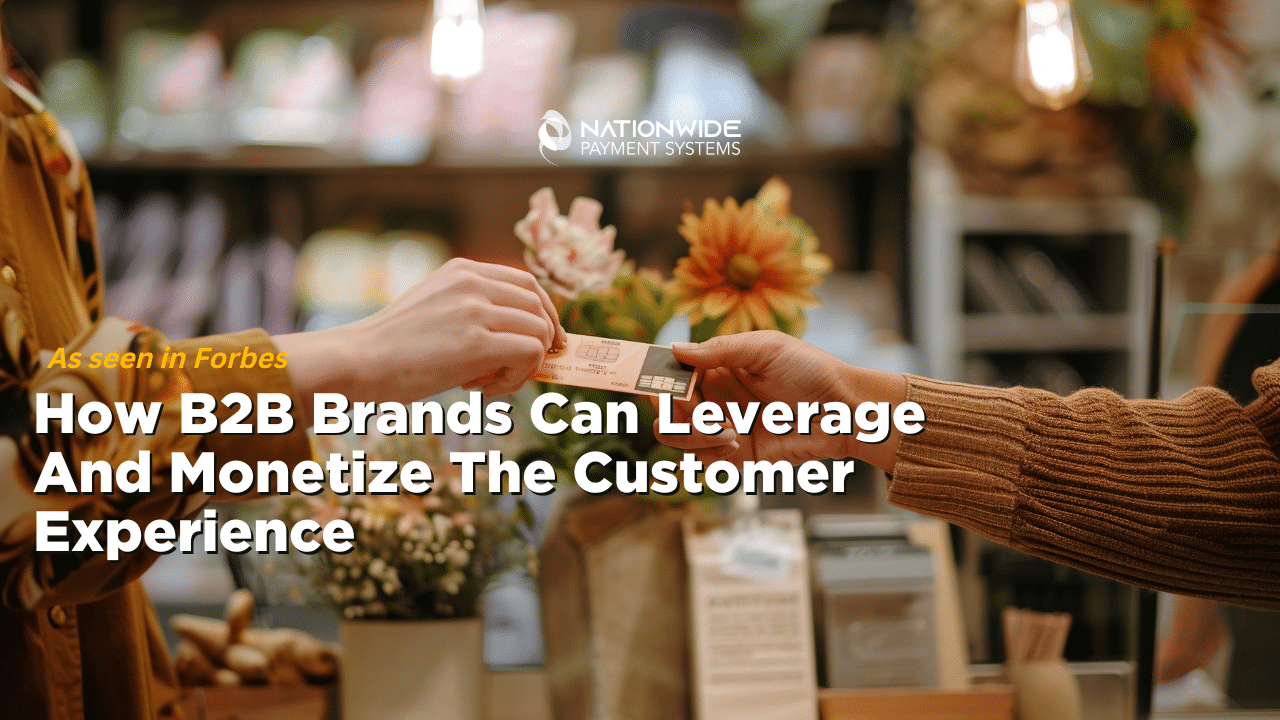Previously featured on Forbes Business Council
In a world where customers expect instant approvals, funding and deliveries, customer experience is the new battleground for companies of all sizes. Today, providing great service means more than answering a call by the third ring or replacing broken equipment overnight. It means creating a unique experience that customers associate with your company and brand. As more companies get into this game, experience itself is at risk of becoming commoditized.
My partner and I have seen this phenomenon in our merchant services business. Business-to-business companies that offer their customers convenient ways to pay want to use those same convenient, secure payment methods when they pay other businesses. I’ve referred to this trend as the consumerization of B2B payments. Examples include sending secure payment links and real-time payments instead of old-school paper-based invoicing.
Product, Service, Experience
James H. Gilmore and B. Joseph Pine II predicted the commoditization of experience in the 1990s when they published The Experience Economy: Work Is Theatre & Every Business a Stage. In response to changing customer behavior, the authors wrote a new introduction to their book in 2019, even before the pandemic accelerated the shift to immersive, shared experiences.
“One thing is certain: customers are less willing to spend time, attention, and money on mere goods and services,” the authors wrote. “Today, people more highly value experiences that engage them in personal and memorable ways.” The authors challenged businesses on these three points.
1. Time is money.
Gilmore and Pine noted that time is the greatest of all commodities, which means how customers spend it is as important as how much time they spend. Services, they stated, are about time well saved, while experiences are about time well spent. In a world where customers want to obtain services at the lowest possible price and greatest possible convenience, how they spend their hard-earned time and dollars matters.
Following this logic, B2B companies that provide premier service should be honoring the time value of money tradition. Unlike B2C companies that try to get customers to spend more time in shops and on websites, B2B firms can give customers the gift of time by reducing the amount of effort involved in performing business-related tasks, such as inventory management or payroll. Understand that time is the greatest commodity, and build consistently exceptional experiences by giving that time away.
Businesses might find it more cost-effective and less labor-intensive to create brand experiences than to push brand messaging across customer channels. B2C brands are creating distinct vibes in hotels, retail stores and the travel industry; they’re transforming customers into brand ambassadors and creating a fast return on investment and optimal search results from positive online reviews.
Upstream, in the B2B space, I’m seeing shoutouts to providers working behind the scenes to create immersive experiences. These positive reviews about sales channel partners, supply chain logistics providers and other vendors are circulating on social media. Have you publicly thanked a service provider for helping your company achieve a goal or better serve a customer? These gestures can enhance third-party relationships.
3. Experience drives revenue.
As the authors noted, experiences can benefit the bottom line, both for companies and their clients. Businesses that create exceptional experiences and measurable ROI for customers can charge premium pricing by demonstrating cost-savings, convenience and ease of use. Can your competitors back their claims of one-of-a-kind experiences with quantifiable results?
When asking for premium pricing, consider your clients’ needs, economic status and objectives to gauge their receptivity to new pricing models, introductory offers and choices. Popular freemium-to-premium pricing models enable businesses to try products, services and experiences at no charge and upgrade over time. Most offerings have the potential to scale alongside growing companies.
Focusing On Your “How”
The experience economy has created a playing field where consumers and brands interact and engage in real time across multiple channels. In this new game, customers evaluate how products and services make them feel, which means a company’s mission statement must reflect its “how” as well as its “why.” Gilmore and Pine recommended asking three questions to ensure you’re delivering an exceptional and measurable customer experience.
1. Are your customers increasing or decreasing the time they spend with your company?
2. Are your immersive customer experiences lowering your customer acquisition costs?
3. Are your revenues coming from experiences, as well as goods and services?
As my partner and I work with multiple companies and industries, we routinely advise clients not to depend on third-party surveys to understand their customers. There’s no substitute for direct communication. Strive to understand customers, leverage storytelling and embrace technology. I believe that’s what it will take to deliver resonant B2B and B2C experiences with measurable returns on investments.
Previously featured on Forbes Business Council
CLICK HERE TO FIND MORE ABOUT OUR PROGRAMS
FAQ: Frequently Asked Questions
Why is customer experience becoming crucial for B2B companies?
A: In today’s experience-driven economy, B2B customers expect seamless, personalized interactions similar to B2C experiences. Enhancing customer experience helps B2B companies differentiate themselves, build stronger relationships, and drive loyalty.
What does the "consumerization of B2B payments" mean?
A: This term refers to B2B companies adopting payment methods common in B2C transactions, such as secure payment links and real-time payments, moving away from traditional paper-based invoicing to meet customer expectations for convenience and speed.
How can focusing on customer experience lower acquisition costs?
By delivering exceptional experiences, companies can turn customers into brand advocates who promote the business through word-of-mouth and positive reviews, reducing the need for extensive marketing efforts and lowering customer acquisition costs.
In what ways can customer experience drive revenue for B2B companies?
Providing memorable and efficient experiences can justify premium pricing, as customers are often willing to pay more for superior service. Additionally, satisfied customers are more likely to make repeat purchases and recommend the company to others.
What are some strategies B2B companies can implement to enhance customer experience?
A: Strategies include simplifying processes to save customers time, leveraging technology for seamless interactions, personalizing services, and actively seeking and acting on customer feedback to continuously improve the experience.








